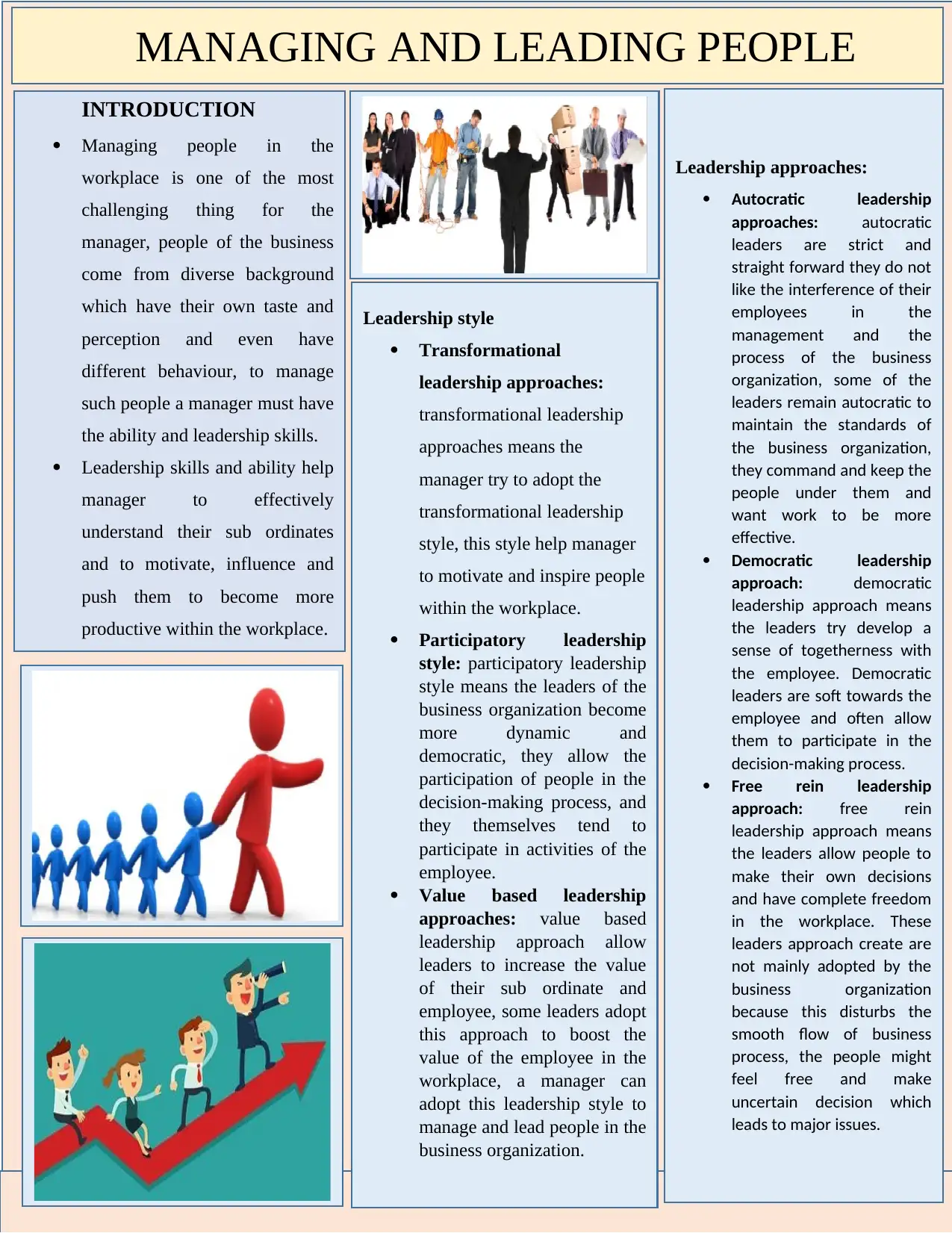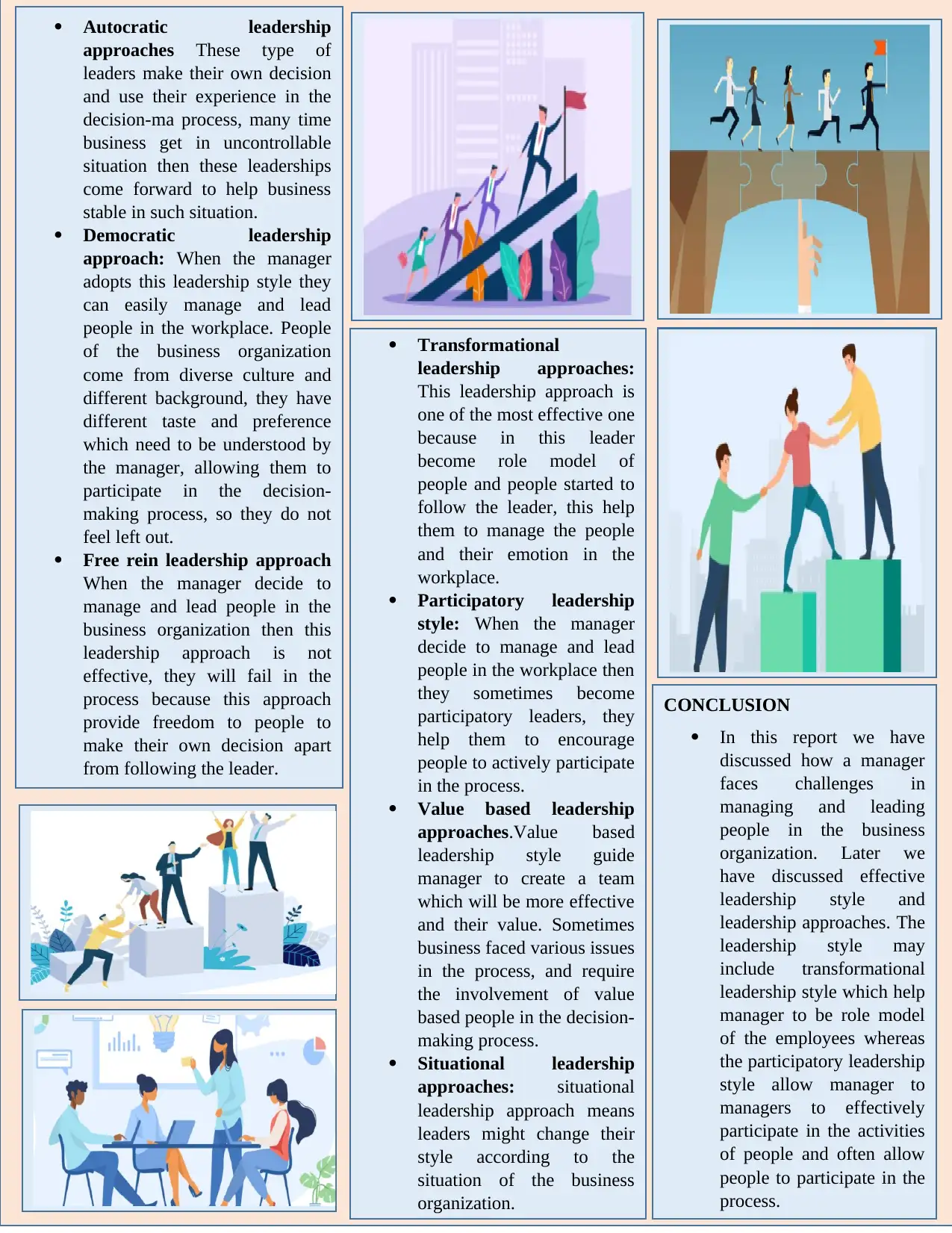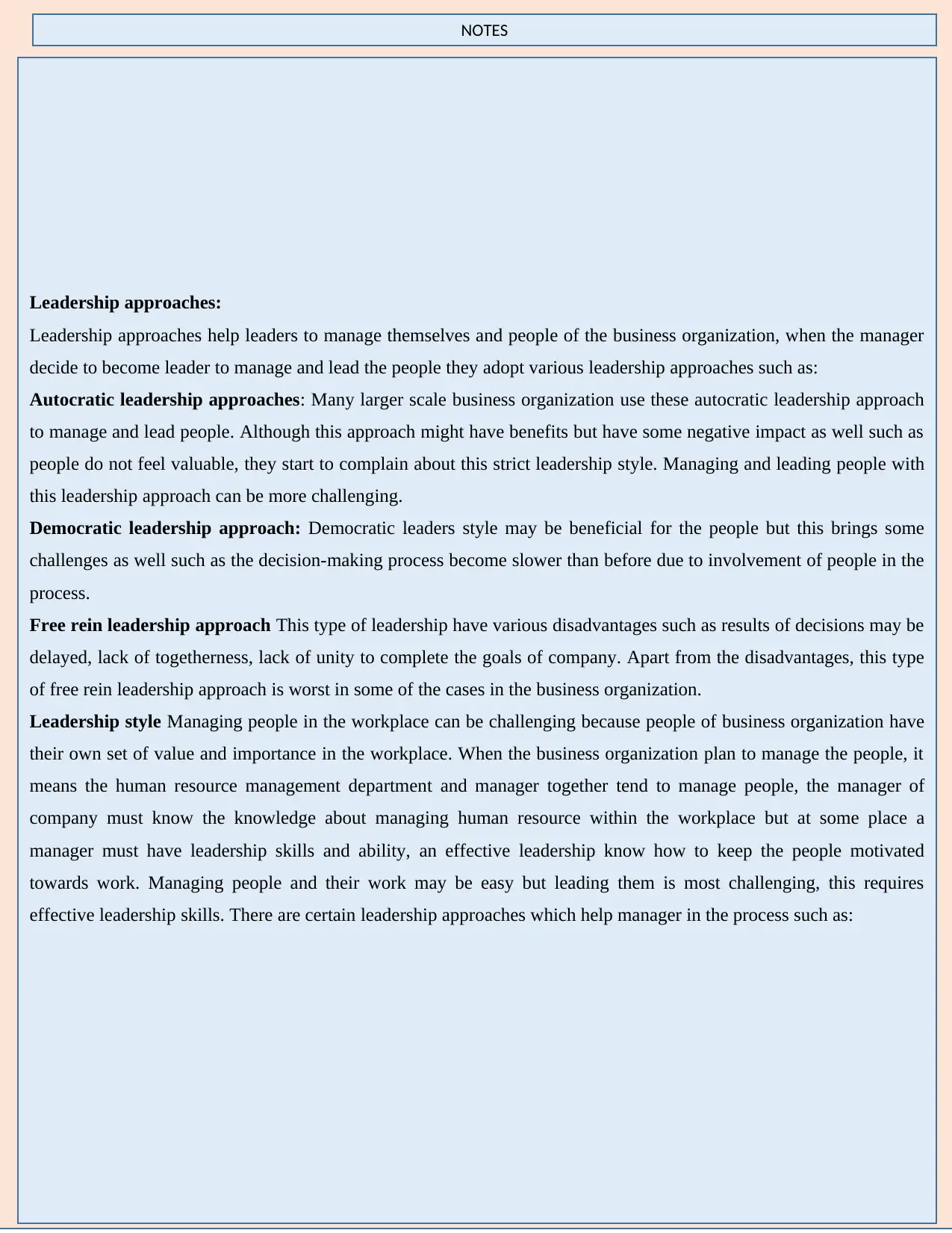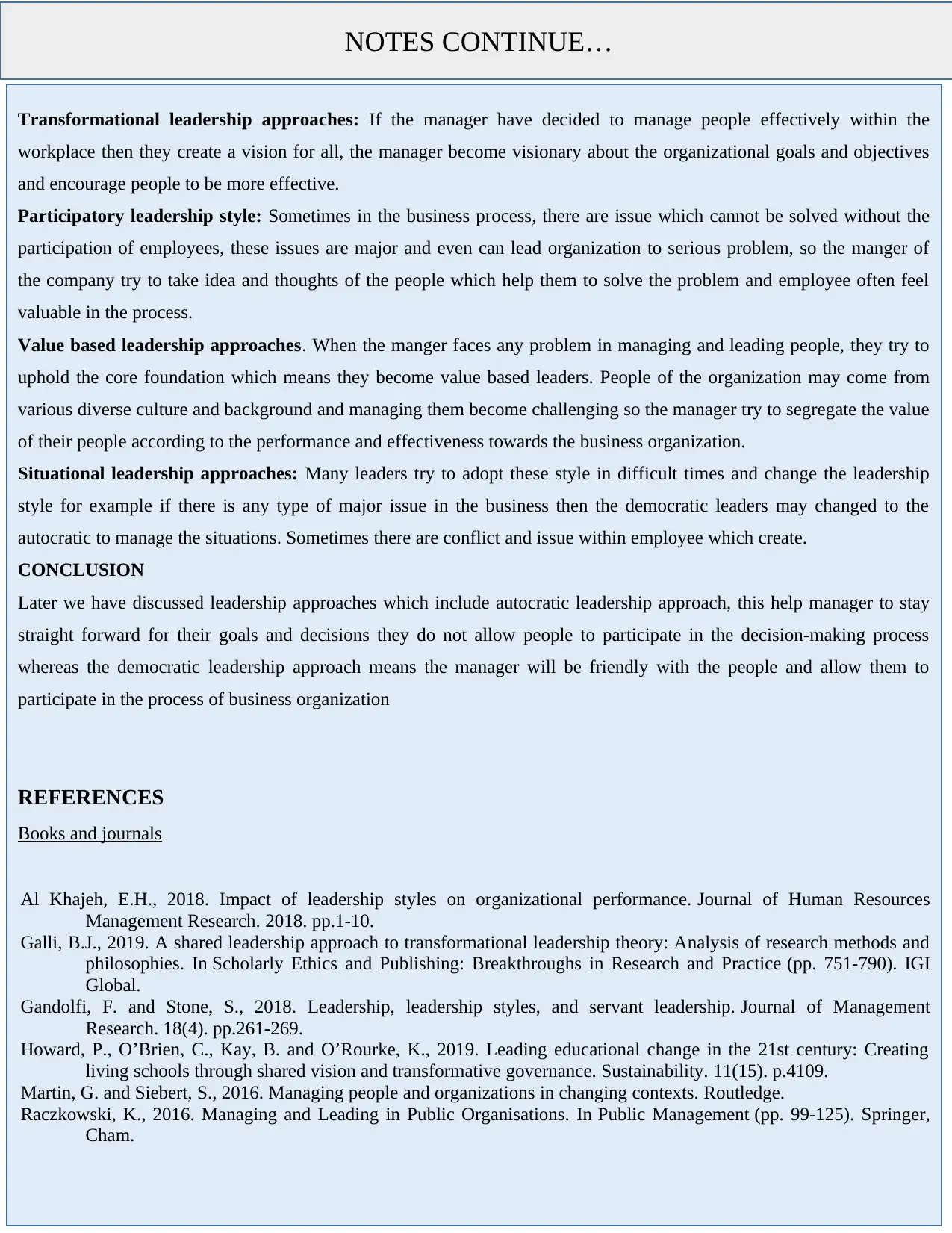Report on Managing and Leading People: Leadership Approach Styles
VerifiedAdded on 2023/06/16
|4
|1604
|483
Report
AI Summary
This report explores various leadership approaches and styles essential for effectively managing and leading people in the workplace. It discusses transformational, participatory, value-based, autocratic, democratic, and free rein leadership styles, highlighting their benefits and drawbacks. The report emphasizes the importance of adapting leadership styles to different situations and understanding the diverse backgrounds of employees. It also touches on the challenges managers face in motivating and inspiring employees, fostering a sense of togetherness, and making effective decisions. The report concludes that effective leadership involves a combination of different approaches tailored to the specific needs and circumstances of the organization.

MANAGING AND LEADING PEOPLE
INTRODUCTION
Managing people in the
workplace is one of the most
challenging thing for the
manager, people of the business
come from diverse background
which have their own taste and
perception and even have
different behaviour, to manage
such people a manager must have
the ability and leadership skills.
Leadership skills and ability help
manager to effectively
understand their sub ordinates
and to motivate, influence and
push them to become more
productive within the workplace.
Leadership approaches:
Autocratic leadership
approaches: autocratic
leaders are strict and
straight forward they do not
like the interference of their
employees in the
management and the
process of the business
organization, some of the
leaders remain autocratic to
maintain the standards of
the business organization,
they command and keep the
people under them and
want work to be more
effective.
Democratic leadership
approach: democratic
leadership approach means
the leaders try develop a
sense of togetherness with
the employee. Democratic
leaders are soft towards the
employee and often allow
them to participate in the
decision-making process.
Free rein leadership
approach: free rein
leadership approach means
the leaders allow people to
make their own decisions
and have complete freedom
in the workplace. These
leaders approach create are
not mainly adopted by the
business organization
because this disturbs the
smooth flow of business
process, the people might
feel free and make
uncertain decision which
leads to major issues.
Leadership style
Transformational
leadership approaches:
transformational leadership
approaches means the
manager try to adopt the
transformational leadership
style, this style help manager
to motivate and inspire people
within the workplace.
Participatory leadership
style: participatory leadership
style means the leaders of the
business organization become
more dynamic and
democratic, they allow the
participation of people in the
decision-making process, and
they themselves tend to
participate in activities of the
employee.
Value based leadership
approaches: value based
leadership approach allow
leaders to increase the value
of their sub ordinate and
employee, some leaders adopt
this approach to boost the
value of the employee in the
workplace, a manager can
adopt this leadership style to
manage and lead people in the
business organization.
INTRODUCTION
Managing people in the
workplace is one of the most
challenging thing for the
manager, people of the business
come from diverse background
which have their own taste and
perception and even have
different behaviour, to manage
such people a manager must have
the ability and leadership skills.
Leadership skills and ability help
manager to effectively
understand their sub ordinates
and to motivate, influence and
push them to become more
productive within the workplace.
Leadership approaches:
Autocratic leadership
approaches: autocratic
leaders are strict and
straight forward they do not
like the interference of their
employees in the
management and the
process of the business
organization, some of the
leaders remain autocratic to
maintain the standards of
the business organization,
they command and keep the
people under them and
want work to be more
effective.
Democratic leadership
approach: democratic
leadership approach means
the leaders try develop a
sense of togetherness with
the employee. Democratic
leaders are soft towards the
employee and often allow
them to participate in the
decision-making process.
Free rein leadership
approach: free rein
leadership approach means
the leaders allow people to
make their own decisions
and have complete freedom
in the workplace. These
leaders approach create are
not mainly adopted by the
business organization
because this disturbs the
smooth flow of business
process, the people might
feel free and make
uncertain decision which
leads to major issues.
Leadership style
Transformational
leadership approaches:
transformational leadership
approaches means the
manager try to adopt the
transformational leadership
style, this style help manager
to motivate and inspire people
within the workplace.
Participatory leadership
style: participatory leadership
style means the leaders of the
business organization become
more dynamic and
democratic, they allow the
participation of people in the
decision-making process, and
they themselves tend to
participate in activities of the
employee.
Value based leadership
approaches: value based
leadership approach allow
leaders to increase the value
of their sub ordinate and
employee, some leaders adopt
this approach to boost the
value of the employee in the
workplace, a manager can
adopt this leadership style to
manage and lead people in the
business organization.
Paraphrase This Document
Need a fresh take? Get an instant paraphrase of this document with our AI Paraphraser

Autocratic leadership
approaches These type of
leaders make their own decision
and use their experience in the
decision-ma process, many time
business get in uncontrollable
situation then these leaderships
come forward to help business
stable in such situation.
Democratic leadership
approach: When the manager
adopts this leadership style they
can easily manage and lead
people in the workplace. People
of the business organization
come from diverse culture and
different background, they have
different taste and preference
which need to be understood by
the manager, allowing them to
participate in the decision-
making process, so they do not
feel left out.
Free rein leadership approach
When the manager decide to
manage and lead people in the
business organization then this
leadership approach is not
effective, they will fail in the
process because this approach
provide freedom to people to
make their own decision apart
from following the leader.
CONCLUSION
In this report we have
discussed how a manager
faces challenges in
managing and leading
people in the business
organization. Later we
have discussed effective
leadership style and
leadership approaches. The
leadership style may
include transformational
leadership style which help
manager to be role model
of the employees whereas
the participatory leadership
style allow manager to
managers to effectively
participate in the activities
of people and often allow
people to participate in the
process.
Transformational
leadership approaches:
This leadership approach is
one of the most effective one
because in this leader
become role model of
people and people started to
follow the leader, this help
them to manage the people
and their emotion in the
workplace.
Participatory leadership
style: When the manager
decide to manage and lead
people in the workplace then
they sometimes become
participatory leaders, they
help them to encourage
people to actively participate
in the process.
Value based leadership
approaches.Value based
leadership style guide
manager to create a team
which will be more effective
and their value. Sometimes
business faced various issues
in the process, and require
the involvement of value
based people in the decision-
making process.
Situational leadership
approaches: situational
leadership approach means
leaders might change their
style according to the
situation of the business
organization.
approaches These type of
leaders make their own decision
and use their experience in the
decision-ma process, many time
business get in uncontrollable
situation then these leaderships
come forward to help business
stable in such situation.
Democratic leadership
approach: When the manager
adopts this leadership style they
can easily manage and lead
people in the workplace. People
of the business organization
come from diverse culture and
different background, they have
different taste and preference
which need to be understood by
the manager, allowing them to
participate in the decision-
making process, so they do not
feel left out.
Free rein leadership approach
When the manager decide to
manage and lead people in the
business organization then this
leadership approach is not
effective, they will fail in the
process because this approach
provide freedom to people to
make their own decision apart
from following the leader.
CONCLUSION
In this report we have
discussed how a manager
faces challenges in
managing and leading
people in the business
organization. Later we
have discussed effective
leadership style and
leadership approaches. The
leadership style may
include transformational
leadership style which help
manager to be role model
of the employees whereas
the participatory leadership
style allow manager to
managers to effectively
participate in the activities
of people and often allow
people to participate in the
process.
Transformational
leadership approaches:
This leadership approach is
one of the most effective one
because in this leader
become role model of
people and people started to
follow the leader, this help
them to manage the people
and their emotion in the
workplace.
Participatory leadership
style: When the manager
decide to manage and lead
people in the workplace then
they sometimes become
participatory leaders, they
help them to encourage
people to actively participate
in the process.
Value based leadership
approaches.Value based
leadership style guide
manager to create a team
which will be more effective
and their value. Sometimes
business faced various issues
in the process, and require
the involvement of value
based people in the decision-
making process.
Situational leadership
approaches: situational
leadership approach means
leaders might change their
style according to the
situation of the business
organization.

NOTES
Leadership approaches:
Leadership approaches help leaders to manage themselves and people of the business organization, when the manager
decide to become leader to manage and lead the people they adopt various leadership approaches such as:
Autocratic leadership approaches: Many larger scale business organization use these autocratic leadership approach
to manage and lead people. Although this approach might have benefits but have some negative impact as well such as
people do not feel valuable, they start to complain about this strict leadership style. Managing and leading people with
this leadership approach can be more challenging.
Democratic leadership approach: Democratic leaders style may be beneficial for the people but this brings some
challenges as well such as the decision-making process become slower than before due to involvement of people in the
process.
Free rein leadership approach This type of leadership have various disadvantages such as results of decisions may be
delayed, lack of togetherness, lack of unity to complete the goals of company. Apart from the disadvantages, this type
of free rein leadership approach is worst in some of the cases in the business organization.
Leadership style Managing people in the workplace can be challenging because people of business organization have
their own set of value and importance in the workplace. When the business organization plan to manage the people, it
means the human resource management department and manager together tend to manage people, the manager of
company must know the knowledge about managing human resource within the workplace but at some place a
manager must have leadership skills and ability, an effective leadership know how to keep the people motivated
towards work. Managing people and their work may be easy but leading them is most challenging, this requires
effective leadership skills. There are certain leadership approaches which help manager in the process such as:
Leadership approaches:
Leadership approaches help leaders to manage themselves and people of the business organization, when the manager
decide to become leader to manage and lead the people they adopt various leadership approaches such as:
Autocratic leadership approaches: Many larger scale business organization use these autocratic leadership approach
to manage and lead people. Although this approach might have benefits but have some negative impact as well such as
people do not feel valuable, they start to complain about this strict leadership style. Managing and leading people with
this leadership approach can be more challenging.
Democratic leadership approach: Democratic leaders style may be beneficial for the people but this brings some
challenges as well such as the decision-making process become slower than before due to involvement of people in the
process.
Free rein leadership approach This type of leadership have various disadvantages such as results of decisions may be
delayed, lack of togetherness, lack of unity to complete the goals of company. Apart from the disadvantages, this type
of free rein leadership approach is worst in some of the cases in the business organization.
Leadership style Managing people in the workplace can be challenging because people of business organization have
their own set of value and importance in the workplace. When the business organization plan to manage the people, it
means the human resource management department and manager together tend to manage people, the manager of
company must know the knowledge about managing human resource within the workplace but at some place a
manager must have leadership skills and ability, an effective leadership know how to keep the people motivated
towards work. Managing people and their work may be easy but leading them is most challenging, this requires
effective leadership skills. There are certain leadership approaches which help manager in the process such as:
⊘ This is a preview!⊘
Do you want full access?
Subscribe today to unlock all pages.

Trusted by 1+ million students worldwide

Transformational leadership approaches: If the manager have decided to manage people effectively within the
workplace then they create a vision for all, the manager become visionary about the organizational goals and objectives
and encourage people to be more effective.
Participatory leadership style: Sometimes in the business process, there are issue which cannot be solved without the
participation of employees, these issues are major and even can lead organization to serious problem, so the manger of
the company try to take idea and thoughts of the people which help them to solve the problem and employee often feel
valuable in the process.
Value based leadership approaches. When the manger faces any problem in managing and leading people, they try to
uphold the core foundation which means they become value based leaders. People of the organization may come from
various diverse culture and background and managing them become challenging so the manager try to segregate the value
of their people according to the performance and effectiveness towards the business organization.
Situational leadership approaches: Many leaders try to adopt these style in difficult times and change the leadership
style for example if there is any type of major issue in the business then the democratic leaders may changed to the
autocratic to manage the situations. Sometimes there are conflict and issue within employee which create.
CONCLUSION
Later we have discussed leadership approaches which include autocratic leadership approach, this help manager to stay
straight forward for their goals and decisions they do not allow people to participate in the decision-making process
whereas the democratic leadership approach means the manager will be friendly with the people and allow them to
participate in the process of business organization
REFERENCES
Books and journals
Al Khajeh, E.H., 2018. Impact of leadership styles on organizational performance. Journal of Human Resources
Management Research. 2018. pp.1-10.
Galli, B.J., 2019. A shared leadership approach to transformational leadership theory: Analysis of research methods and
philosophies. In Scholarly Ethics and Publishing: Breakthroughs in Research and Practice (pp. 751-790). IGI
Global.
Gandolfi, F. and Stone, S., 2018. Leadership, leadership styles, and servant leadership. Journal of Management
Research. 18(4). pp.261-269.
Howard, P., O’Brien, C., Kay, B. and O’Rourke, K., 2019. Leading educational change in the 21st century: Creating
living schools through shared vision and transformative governance. Sustainability. 11(15). p.4109.
Martin, G. and Siebert, S., 2016. Managing people and organizations in changing contexts. Routledge.
Raczkowski, K., 2016. Managing and Leading in Public Organisations. In Public Management (pp. 99-125). Springer,
Cham.
NOTES CONTINUE…
workplace then they create a vision for all, the manager become visionary about the organizational goals and objectives
and encourage people to be more effective.
Participatory leadership style: Sometimes in the business process, there are issue which cannot be solved without the
participation of employees, these issues are major and even can lead organization to serious problem, so the manger of
the company try to take idea and thoughts of the people which help them to solve the problem and employee often feel
valuable in the process.
Value based leadership approaches. When the manger faces any problem in managing and leading people, they try to
uphold the core foundation which means they become value based leaders. People of the organization may come from
various diverse culture and background and managing them become challenging so the manager try to segregate the value
of their people according to the performance and effectiveness towards the business organization.
Situational leadership approaches: Many leaders try to adopt these style in difficult times and change the leadership
style for example if there is any type of major issue in the business then the democratic leaders may changed to the
autocratic to manage the situations. Sometimes there are conflict and issue within employee which create.
CONCLUSION
Later we have discussed leadership approaches which include autocratic leadership approach, this help manager to stay
straight forward for their goals and decisions they do not allow people to participate in the decision-making process
whereas the democratic leadership approach means the manager will be friendly with the people and allow them to
participate in the process of business organization
REFERENCES
Books and journals
Al Khajeh, E.H., 2018. Impact of leadership styles on organizational performance. Journal of Human Resources
Management Research. 2018. pp.1-10.
Galli, B.J., 2019. A shared leadership approach to transformational leadership theory: Analysis of research methods and
philosophies. In Scholarly Ethics and Publishing: Breakthroughs in Research and Practice (pp. 751-790). IGI
Global.
Gandolfi, F. and Stone, S., 2018. Leadership, leadership styles, and servant leadership. Journal of Management
Research. 18(4). pp.261-269.
Howard, P., O’Brien, C., Kay, B. and O’Rourke, K., 2019. Leading educational change in the 21st century: Creating
living schools through shared vision and transformative governance. Sustainability. 11(15). p.4109.
Martin, G. and Siebert, S., 2016. Managing people and organizations in changing contexts. Routledge.
Raczkowski, K., 2016. Managing and Leading in Public Organisations. In Public Management (pp. 99-125). Springer,
Cham.
NOTES CONTINUE…
1 out of 4
Related Documents
Your All-in-One AI-Powered Toolkit for Academic Success.
+13062052269
info@desklib.com
Available 24*7 on WhatsApp / Email
![[object Object]](/_next/static/media/star-bottom.7253800d.svg)
Unlock your academic potential
Copyright © 2020–2025 A2Z Services. All Rights Reserved. Developed and managed by ZUCOL.




